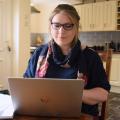It is a day that has been observed since the early 1900s with the aim of inspiring women to achieve their dreams without facing oppression.
And a group of students from a Norwich academy took part in yesterday's International Women's Day to embrace local women's success.
The all-female group from City Academy Norwich on Earlham Road were visited by inspirational woman from across the county.
Norfolk police chief inspector Amanda Ellis, told the students: 'Your limits are the ones you set yourself. Don't let anyone set your limits for you.'
Mrs Ellis was joined by Julie Inns, diversity advisor for Norfolk Constabulary Diversity Department, Lynette Raven, Norfolk County Council worker for the Community Safety Team, Hajira Ben Moussa from the Neesa Project, which provides social and educational activities for women and children and Dawn Jackson from Norwich's Future Projects.
Mrs Inns explained why a day like this is so important and said: 'We wanted to get the right message to girls who thought that they couldn't achieve anything.
'The day highlights that even though we have had legislation around for years, women are still seen as second-class citizens in some areas.'
Mrs Inns also shared her experiences with the students and explained that even though she left school with no solid qualifications, she went back to education in her thirties to pursue the career she has today.
'We are all from different backgrounds and we wanted to show the girls that they can achieve anything,' she explained.
'I don't think that the glass ceiling is as high as it once was but I do think women have difficulties reaching those levels. The message is that there may be a ceiling there but they is no reason why they can't smash through it.'
Year 10 student Kendal Cullabine is 16 and wants to train to become a chef in the army. 'Before today I didn't think I would be able to do it,' she said. 'I now know more about the day, and how sexism exists.'
International Women's Day began as a national day in the United States and is now celebrated annually on March 8 with thousands of events being held all over the world ranging from political rallies to theatrical performances.
For more information visit the website www.internationalwomensday.com
International Men's Day is held annually on November 19.
Have you been involved with an event that celebrates the success of an individual? Contact reporter Donna-Louise Bishop at donna-louise.bishop@archant.co.uk or call 01603 772438.
Great women in Norwich history
• Edith Louisa Cavell (1865 – 1915) was a Norfolk born nurse who saved the lives of casualties from all sides in the first world war and helped around 200 Allied soldiers escape from German-occupied Belgium, for which she was arrested. She was court-martialled and found guilty of treason, sentenced to death and shot by firing squad. Her remains were returned to Britain after the war and a state funeral was held at Westminster Abbey. On 19 May 1919, her body was reburied at the east side of Norwich Cathedral.
• Elizabeth Fry (N�e Gurney) (1780 – 1845) was an English prison reformer and Quaker philanthropist. Since 2001, she has been depicted on �5 note.
• Jenny Lind - The 'Swedigh nightingale' - was an opera singer who fell in love with Norwich and gave two free concerts which raised more than �1000 for charity which resulted in the setting up of the Jenny Lind Infirmary for Sick Children, in 1854.
• Sarah Glover (1786-1867) creator of the Norwich sol-fa system of teaching music, later popularised in the Sound of Music film.
• Harriet Martineau (June 12, 1802 – June 27, 1876) was born in Norwich, and becaming a writer on society and economic issues. She died on 27 June 1876 and left an autobiographical sketch to be published by the Daily News, in which she wrote: 'Her original power was nothing more than was due to earnestness and intellectual clearness within a certain range. With small imaginative and suggestive powers, and therefore nothing approaching to genius, she could see clearly what she did see, and give a clear expression to what she had to say. In short, she could popularize while she could neither discover nor invent.'



Comments: Our rules
We want our comments to be a lively and valuable part of our community - a place where readers can debate and engage with the most important local issues. The ability to comment on our stories is a privilege, not a right, however, and that privilege may be withdrawn if it is abused or misused.
Please report any comments that break our rules.
Read the rules here